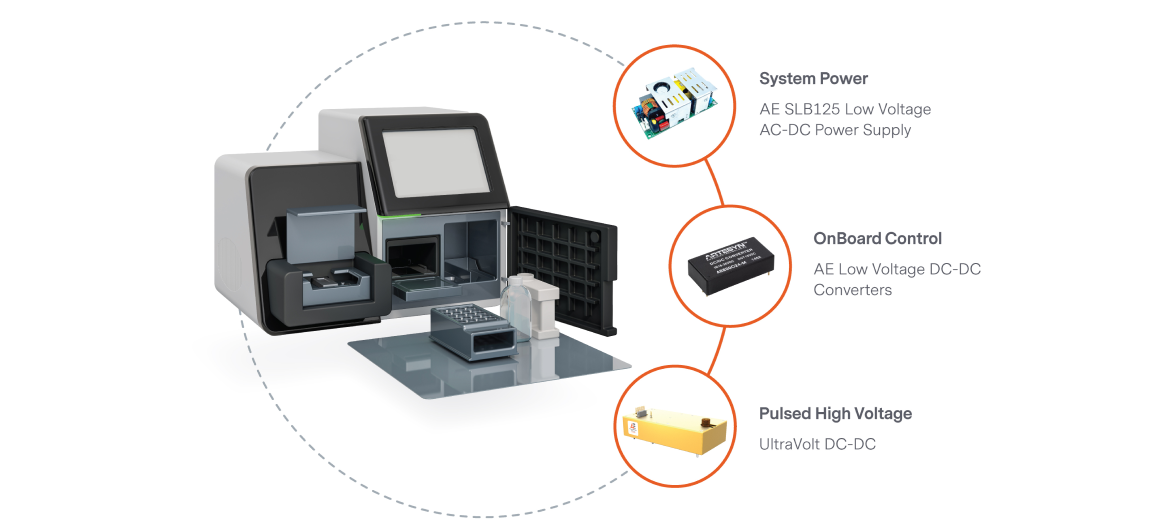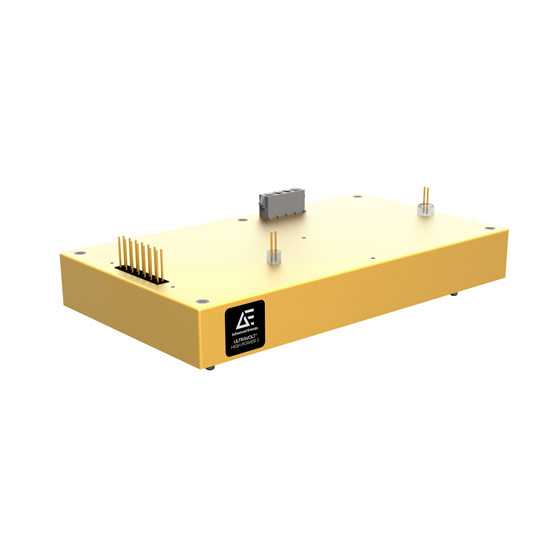Optimizing Electroporation: The Role of High Voltage Power Supplies
Veröffentlicht November 26, 2024 von John Toro
Blog Summary:
The blog discusses the importance of high-quality high voltage power supplies in the electroporation process, which is used to introduce substances like antibodies, drugs, or viruses into cells. Key points include:
- Voltage and Power Requirements: Electroporation requires a clean, stable high voltage signal, typically ranging from 10 VDC to 4,000 VDC, and power levels between 20 W and 60 W.
- Stability and Efficiency: Maintaining voltage stability is crucial to avoid cell damage. Efficient power supplies are needed to meet the demands of increasingly compact lab instruments.
- Additional Features: Important features for power supplies include variable voltage range, resistance to arcs and compact size.
- Advanced Energy (AE): AE provides specialized power solutions for life sciences, ensuring sensitive electronics are protected and offering scalable solutions for various applications.
The effectiveness of introducing substances such as antibodies, drugs, viruses, or any other materials into a cell is greatly enhanced by using a modern technique: electroporation. However, the success of the electroporation process is highly dependent upon the quality of the high voltage power supply.
The primary requirement for the power supply is to provide a clean, stable high voltage signal to the samples such as cells. Voltage levels in electroporation typically range from 10 VDC to 3,000 VDC, though they can go up to 4,000 VDC. Power levels of the HV-DC/DC supply typically fall between 20 W and 60 W.
Voltage, power, and stability considerations are essential for achieving optimal results. Additionally, other important factors and desired features should be taken into account for power supplies used in lab electroporation, including (but not limited to) the following:
Voltage range: While many systems operate at a fixed voltage, the ability to vary the voltage from one extreme to another (or to simply fine-tune the voltage to a single level) results in the power supply delivering the exact voltage needed for a particular process and will ensure the most effective transfection.
Power range: The unit must be capable of providing and maintaining the high voltage signal to samples at the required wattage level without droop or overage. This ability will sustain the cell structure’s integrity and reduce damage to critical samples from overheating.
High stability: This is the ability to maintain the voltage setpoint when being pulsed by an external pulse circuit. During the transfection process, the voltage must be maintained at the ideal field strength to allow cell porosities to develop but should not exceed the established safety margin, which could lead to irreversible electroporation and ultimately cell death. In addition, the physical size of the sample vessel itself will dictate the maximum voltage that can be applied without danger of arcing or flashover between the electrodes.
Resistance to arcs: Sample vessels can be contaminated during handling, causing creepage paths across electrodes in electroporation. A robust power supply that resists damage from arcs allows continuous experiments with minimal downtime, as it can handle external arcs without interrupting the process.
Efficiency: With nearly every lab instrument getting smaller and smaller there is an increasing demand for these systems to become more energy efficient. As a result, the high voltage power supply must be increasingly efficient to reduce its overall effect on the power budget of the instrument.
Compact size: Along with increasing efficiency, instruments are becoming smaller, with many desktop systems on the market. To keep in pace with this size shift, high voltage power supply manufacturers must employ innovative technologies that result in smaller footprints, greater maximum voltage in a smaller package and ultimately the most compact solution.
A strong presence in the life sciences market: Advanced Energy (AE) provides solutions to the unique and demanding power requirements of the life science industry. This level of expertise runs from low voltage AC/DC and DC/DC sections of the systems all the way up to and including the high voltage portion. AE’s power supplies ensure sensitive system electronics are not subjected to vibration and air disturbances, while addressing portability needs of benchtop systems. These scalable solutions are ideal power platforms for larger enterprise systems.
 Figure 1. An example of Advanced Energy power solutions for life science applications.
Figure 1. An example of Advanced Energy power solutions for life science applications.
In summary:
As in almost any modern piece of life sciences equipment, there are numerous sections and components within an electroporation system that contribute to the outcome of test results. Similarly, the role of the high voltage power supply plays a significant role in ensuring those critical tests are achieved. Advanced Energy (AE) provides solutions to life science customers that are engaged in various applications, including electroporation, analytical chemistry and the materials analysis market.
As in almost any modern piece of life sciences equipment, there are numerous sections and components within an electroporation system that contribute to the outcome of test results. Similarly, the role of the high voltage power supply plays a significant role in ensuring those critical tests are achieved. Advanced Energy (AE) provides solutions to life science customers that are engaged in various applications, including electroporation, analytical chemistry and the materials analysis market.

Figure 2. Advanced Energy’s High Power C Series of regulated DC to DC supplies is optimal for laser, capacitor charging, pulsed power, pulse generator and test equipment applications.
AE’s broad portfolio of high voltage products, including the High Voltage C Series, the High Power C Series, A Series and AA Series, and expertise in life sciences applications provides a solution for a wide range of voltage and power levels within this market, as well as in related fields. For more information on Advanced Energy’s power solutions for the life sciences visit: Life Science | Advanced Energy.
John Toro
Advanced Energy
John is a Customer Solutions Engineer at Advanced Energy with a focus on high voltage power supplies for medical applications. He works with customers to identify complex technical requirements and develop customized solutions.
Mehr Beiträge von John Toro
durchsuchen
Kategorien A-Z
Tragen Sie sich in unsere Mailingliste ein
Abonnieren
Neueste Beiträge
View on X
.jpg)
